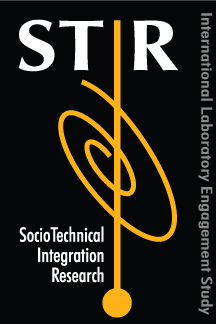Core Themes & Questions
Communities of Integration Workshop
Tempe Mission Palms Hotel
Arizona State University, Tempe, AZ
May 21-22, 2013
Form
On what do differing explanations for socio-technical integration focus? Are there interactive relationships among these various focal points? Can we articulate fundamental questions that cut across them?
Collaboration of any kind involves a complex assortment of different social, epistemological, and psychological elements. Integrative approaches vary, however, in terms of which elements they focus on: SEE focuses on language in the role of interactional expertise; Trading Zones on exchanges between collaborators, whether linguistically mediated or otherwise; Toolbox on logical structures underlying different disciplinary accounts; and STIR on the relation among routine practices, reflexivity and decision content.
Each offers some account of the role of tacit elements in socio-technical collaboration, but each approaches the content and analysis of what is tacit differently—for instance emphasizing varying types and combinations of knowledge, habit, ideology, and emotions. A similar variance surrounds the role accorded to communicative elements. The objective in asking about form is not to make a taxonomy of a limited set of differences, so much as to engage all workshop participants in mapping out underlying conceptual ground—both common ground and key fault lines that must be taken into account in order to develop cross-cutting theoretical questions for a transformative research agenda.
Means
What are the most rewarding opportunities, pressing challenges, and perplexing trade-offs for the advancement of empirical and experimental understandings of socio-technical integration?
Drawing on the methodological variety of the workshop participants, we will seek to bolster continued and future research directions by identifying cross-cutting interests that have to do with designing engaged research studies and experiments, and with extracting and interpreting meaningful data from these. Asking about socio-technical means will in part allow for taking stock of best practices, but more significantly it will challenge all participants to identify practical questions about opportunities and challenges that are themselves amenable to empirical analysis.
Thus we hope to develop intellectual resources that can inform research design choices—from generating testable hypotheses to thick descriptions—especially in the context of engagements that are intended to spark, enhance or observe dynamic socio-technical collaborations. As with the theoretical questions, we do not expect some new universal methodology to emerge, but rather a contextualized repertoire of different approaches, practical insights, and design considerations.
Ends
What role do socio-technical integrative and collaborative efforts play in contributing to socially transformative, responsible, responsive, or sustainable forms of science, technology and innovation?
Participants will be encouraged not only to revisit and explicate the general rationales behind calls and programs for socio-technical integration, but also to reflect more concretely on what empirical and experiential understanding has been accumulated to support and inform the articulation and pursuit of socially-relevant goals and important public norms. Critically reflecting upon socio-technical ends will further participants’ reflexive awareness of the various framings and logics that underwrite their own endeavors, and it will inform the discussions of forms and means in the development of the research agenda.
Thus the workshop will seek to bridge distinct discourses of interdisciplinary research, for instance discussions that focus on generating new conceptual and methodological paradigms with discussions that seek to enrich the responsiveness of science and innovation through broader trans-sector engagement of stakeholders and societal actors. The goal is not simply to generate new forms of knowledge as an academic outcome but also to engage in “translational” realization of science, technology, and innovation as a public good.




